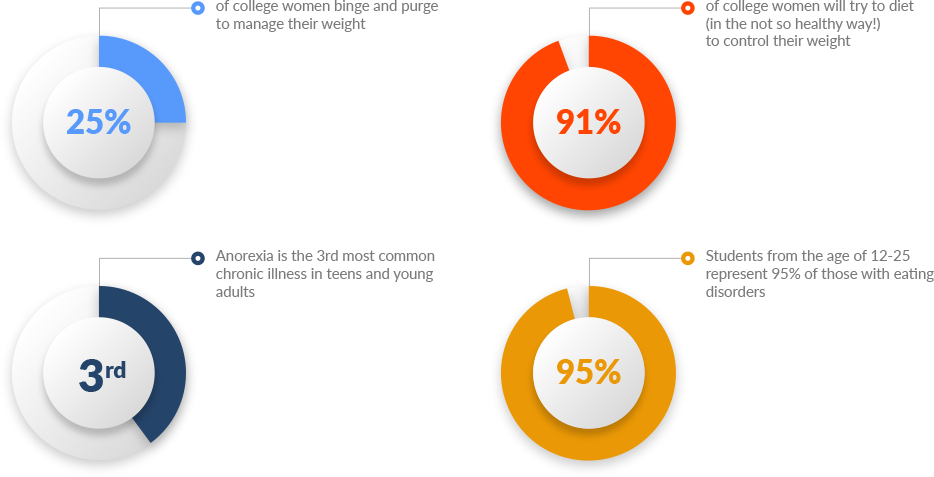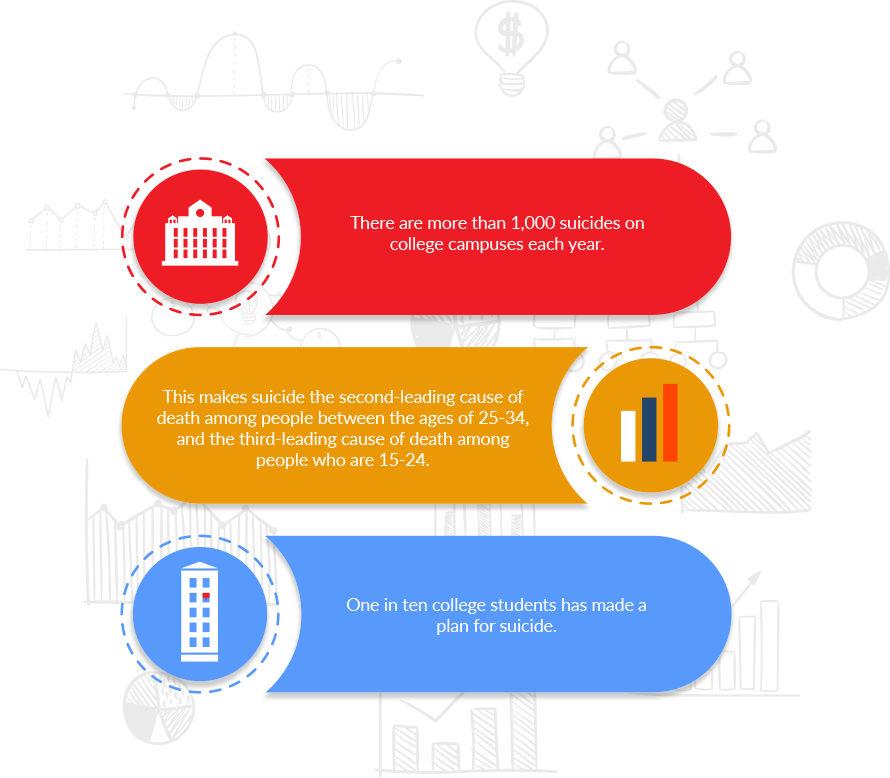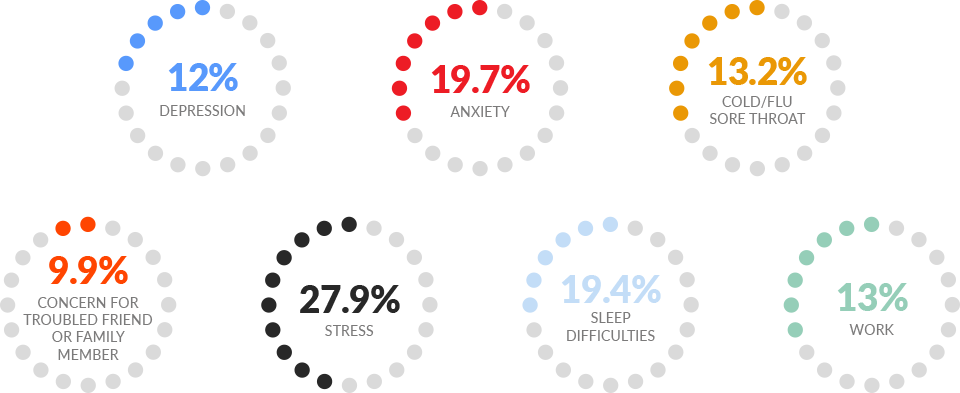Mental health issues are becoming more prevalent in the college setting, which is why it is important for students and concerned family members to be familiar with it.
At CollegeStats, we designed this guide to help you identify the signs and symptoms of common mental health issues for college students. If left untreated, these issues can surely escalate and become debilitating for students. With that said, this guide will guide you on where and when to seek help as well. If you feel that you might be battling some mental issues or know someone that might be, then it is important to take action now rather than later.
To give you a quick idea on the statistics of mental health issues that students face during their college years, the National Alliance on Mental Illness demonstrates that:

Mental health issues can take many forms. The popular ones include depression, anxiety, suicide, eating disorders, and addiction. While it may be difficult to come to terms with any illness, it’s important to be aware and be familiar with the resources available whenever they are needed.
Students will likely experience some sort of mild depression at the very least some time during their college years, which can be normal. However, it’s crucial to know when you or someone might be going overboard and need medical help. Basically, depression is a type of brain disorder that is likely caused by a combination of genetics, environmental, biological, and psychological factors. More students than ever have been going in to see the doctors to get treated for depression today.

Everyone is different, so the symptoms may vary from person to person. How someone deals with depression will also differ greatly. If you’re wondering whether you or someone you know is suffering from depression, please consider the following symptoms on a general scale:
Of course, we all have our good and bad days, and it’s completely normal to feel one or some of these emotions every now and then. For example, if you’re new to college and just moved away from home, you might feel an increased level of sadness, or might also have a hard time concentrating because you’re thinking about your family. It can be pretty stressful being away from home and having to adjust to a new lifestyle. Keeping these emotions in check and communicating frequently with those you trust about your feelings is the right way to adjust and be healthy. People can always see things more clearly when they aren’t dealing with it directly themselves, so you may be able to get valuable advice from a trustworthy family member or friend.
However, if you feel that you might be feeling one or more of these on a regular basis, then you may want to check into your school’s mental health center and get evaluated. A health care professional will be able to assess and better help you determine what medications you need to take to improve, if any at all, or give more specific advice catered to your symptoms. Many people fail to get checked out because they are in denial or feel embarrassed to do so, but it’s always better to be safe than sorry. In this case, it’s also better to get treated while the symptoms are fresh, rather than wait until it’s too late. Everyone has their own insecurities, and this shouldn’t be one of them.
Again, symptoms are going to vary greatly from person to person, but here are some questions to consider asking yourself:
Does your family have a history of depression?
Depression can be genetic, so if you do have history and are feeling some of the symptoms mentioned above on a severe level, then it may be worthwhile to check into a doctor’s office to get evaluated.
Do you often experience extreme sadness or hopelessness?
Despondence every now and then is completely normal, but if you find that these feelings are overbearing and potentially affecting your day-to-day life, it’s time to seek help.
Have you been resorting to alcohol and drugs to alleviate any negative feelings?
Unfortunately, alcohol and drugs are both not great escapes to relieving any pain or discomfort in feelings. They may be a temporary solution, but that’s about it. They may be a temporary solution, but that’s about it. Spare yourself possible lung cancer and liver damage by getting the proper medications that you need to fight depression as early as possible.
Do you often think about commiting suicide?
Similar to alcohol and drugs, suicide is never the answer. Even though it may seem like people are busy living their lives, you’d be surprised at how people will stop to talk if they see you open up and needing help. So, don’t ever hesitate to reach out to someone trustworthy to share your feelings with. That person can help guide you to the right people to get help before it’s too late. Life is not easy feat for anyone, and if you don’t feel comfortable opening up to a friend or family member, there are always counselors on campus that you can turn to confidentially.
Nobody said college was easy -- in fact, there will be many moments in which students find themselves feeling anxious, whether it be over meeting new people or preparing for an exam. College is also a time when people are still learning more about themselves and growing at a rapid pace. With so much going on, it’s completely normal to get anxious. I mean, who wouldn’t get anxious over having to juggle many assignments, take rigorous exams, meet new people, and take on a part-time job? Don’t feel bad if you feel anxious, because chances are, many other students are in the same boat.
While a certain degree of anxiety is acceptable, it’s important to know when it’s going overboard. Similar to depression, anxiety can easily escalate into something more harmful. With that said, students who feel that their anxiety is affecting their quality of living should most definitely consult a mental health specialist or counselor to determine the type of anxiety they have and figure out the best solutions to overcome it before it’s too late.
According to Anxiety and Depression Association of America,

It’s hard to pinpoint specific symptoms for everyone, because everyone has their own way of showing anxiety (and subsequently, suppressing it as well), and dealing with it. However, on a general scale, here are some things to look into if you think you or someone you know may be experiencing anxiety requiring medical help:
Again, these symptoms are normal to a degree and experienced by people in and outside of school. However, if you feel that it may be interfering with your performance in your classes or interacting with people, then it may be time to seek help. Recognizing the signs is the first step to healing from any anxiety disorder. It’s important to note that occasional feelings of anxiety do not automatically indicate that you have an illness. If these feelings of anxiety persist, however, then it won’t be a bad idea to reach out for some help.
Having anxiety during test periods or big social settings is normal for most. If you feel that you might be abnormal for whatever reason, then it’s time to do some research and possibly reach out for help. Regardless of what you do, never blame yourself or others for having anxiety because it is completely faultless. Rather, it is an illness that can be fixed with medical attention. Some questions to ask yourself if you’re trying to find out whether you have an anxiety disorder is:
If the answer is yes to one or more of these, it may be worthwhile to err on the safe side and seek medical attention. By seeing a mental health professional, you can get personalized guidance on how to heal properly.
College life can be hectic, and it can be easy to skip meals or develop irrational emotions toward food and weight issues. Because college is a time where students are still growing and bound to feeling extra self-conscious, more students experience eating disorders than they’d like to admit. With that said, a vast majority fail to seek help, or they don’t realize the great extent of their issues. If ignored, eating disorders can definitely lead to debilitating results and life-threatening issues. The National Association of Anorexia Nervosa and Associated Disorders indicate that:

While these numbers do not reflect male behavior with regards to eating disorders, the illness is just nearly as likely to develop in males as it is for females. Many people don’t seek treatment because they might feel it’s taboo or that it’s embarrassing for anyone to find out about their disorders. Men are more likely to suppress themselves because anorexia and bulimia are often viewed culturally as women’s issues.
Symptoms for pretty much any type of disorder is going to vary from person to person, as will the methods for dealing with it. Some red flags for binging, bulimia, or anorexia include:
If left untreated, eating disorders can result in life-altering results such as:
It’s important to keep in mind that we all have days where we don’t feel as pretty as we want to be, or we want to be skinnier. I mean, who doesn’t want to look like a supermodel straight out of a Vogue magazine? Despite this, it’s crucial to stay grounded and realize that flaws are what make us who we are. While it may be hard to squeeze in a healthy meal in between classes everyday, students should make a conscious effort to do so whenever possible.
Recognizing the signs of eating disorders will be the first step towards recovery. The step after recognizing is to seek help from a mental health professional, who will assess your individual issues and determine the best way to resolve them. Before seeking help, you may consider asking yourself the following questions:
If you’ve answered yes to one or more of these and feel that your behavior is negatively impacting your day-to-day living, it’s time to seek professional help. When it comes to mental health disorders, it’s always better to determine and fix the problem as early as possible.
The worst possible outcome to any untreated mental health issue is suicide. This can very much be avoided, which is why it is important to seek help early on when you think you or someone you know might need it. People can have suicidal thoughts for so many reasons -- whether it be discontentment in life of some sort, lack of self-confidence, feelings of hopelessness, excessive stress and pressure to fulfill standards set upon them… the list goes on. Anyone who has seriously considered committing suicide should consult a mental health professional immediately. There are plenty of suicide hotlines that are available to help and you can even be anonymous while getting the help you need.
Emory Cares for You indicates that:

The first sign to determining whether you need help is recognizing the signs. Often times, people might think their ways of thinking or behaviors are normal, when in fact, they are not. Some people are able to suppress their feelings so well in front of others that it might take extra observing to see that they need help. Some common suicidal warning signs are:
Most college students who decide to take their lives have a treatable mental illness. If diagnosed at the early stage, suicide can be avoided. Common causes for suicide may include:
One who is constantly mentally unstable may experience feelings of hopelessness and depression. When severe enough, it can lead to suicidal thoughts. Feeling too overwhelmed or anxious can also draw you to this path. If you think you might be suicidal, consider asking yourself the following questions before seeking professional help:
If you have answered yes to any of these questions, tell a friend or family member that you trust or set up an appointment to see a medical professional for help before it’s too late. Suicide is tragic for those who love and care for you, and help is always available one way or another. The earlier you seek help, the better.
While depression, anxiety, eating disorders, and suicide are the main mental health issues that students experience, there are also a few others to keep in mind and watch out for. They go hand-in-hand with the above illnesses. These include:
With the high stress levels from overlapping exams, term papers, part-time jobs, and the need to socialize, college life can be a very rapid and extreme transition for many coming out of high school, or even a community college. It’s no easy task to juggle all of the tasks that students have to do, and as a result, many struggle with some form of mental health illness in college.
A survey on Huffington Post found that the following percentages of students reporting various factors as impacting their academic successes are as follows:

As you can see, stress is a large factor causing students mental health issues. With stress comes a variety of other difficulties like sleep difficulties, weakened immune system, depression, etc.
While the symptoms to the above illnesses are normal to an extent, it is important to know when you should seek help and where you can get help. Most colleges should have a health center where students can speak with a professional. If not, students can always call in to hotlines to speak with someone about their concerns.